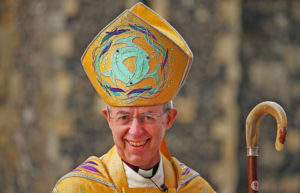“Our parent, who art in heaven.” It has rather lost something, don’t you think? Father has gravitas. It speaks of intimacy, protection, nurture. Parent, on the other hand, is one of those cold, anonymous, bureaucratic words that the school uses when it writes to me about my son. It’s the language of the census, not a warm embrace.
But that is the kind of language the Church of England is considering. No more He for God. The pronouns of the Almighty are going to be They/Them.
First, let me state the obvious: no one thinks the Judeo-Christian God is a man. Father is a metaphor, as is burning bush, fountain, lamb, shepherd, rock, river… Words are inadequate to describe the author of life. But they are all we have.
And language can play tricks. Many languages assign a gender to genderless things. In Hebrew, the word “table” is masculine and “door” is feminine. The same in Russian. In French, both are feminine. But no one believes the door has a gender identity, still less a sex. That’s just how the language works. The fact that, grammatically speaking, God in the Bible mostly takes male pronouns doesn’t mean God is male.
But I do get it: language matters. And gendered nouns do influence the way we think about the reality of the thing to which they refer. And this can easily be extended to how we describe the almighty. Given that people of faith think of God as another way of talking about ultimate reality, the gendered nature of God language could easily be a way of projecting male superiority in the very nature of things. Patriarchal assumptions are reflected and reinforced and then projected onto the stars.
Equally, the gender of certain nouns can often seem to reflect some of the basic dynamics of sexual politics. Take the Hebrew word for both “womb” and “breasts”. They are both male. By making these words masculine, might this reflect a subliminal sense of ownership — that the language is somehow exonerating, justifying even, the perspective of the male gaze?
Should we take this to mean that God reflects the projection of the male perspective upon the universe? In the beginning, perhaps. But, today, children aside, does anyone really imagine God as a man. Judaism and Islam are especially clear on this. God is beyond gender. They/them in reality, even if He/Him grammatically. That’s just the way language works.
Which is why conscripting the impossibility of describing God with human words into the culture war about gender identity is just mischief-making. Only those with a ridiculously naive and anthropomorphic view of God as a man with a white beard can be in any way disturbed by the observation that God is beyond gender. And if they have such a view, they deserve to have it disturbed.
All those many different words to describe God do have a theological purpose. It is to undermine one of the cardinal sins of the Bible: making God into a thing of one’s own image. To call God both a fountain and a rock – He can’t be both – is a way of saying something about God and taking it back at the same time. It is how mystical, technically cataphatic, theology makes its raids on the unspeakable. Occasionally giving God she/her pronouns is a perfect example of the way cataphatic theology can rightly undermine some sort of idolatrous, fixed idea of what God is.
Of course, with Christianity, things are a little trickier. Because here, Jesus is God — he is “the image of the invisible God” (Colossians 1.15) — and Jesus was a man. Clearly he/him. Yesterday at General Synod, the cheeky reactionary, my friend Fr Marcus Walker, averred: “I just don’t think we should be misgendering God. He’s made it clear what his pronouns are — especially in his incarnation — so maybe we should just use them.” Funny yes, correct no. The incarnation of God as male tells us no more about God than his incarnation as ginger or dark haired. There is no read across from Jesus being a man to God being one.
“God is our Mother as truly as he is our Father,” wrote Julian of Norwich back in the 14th century. It’s hardly breaking news.
But this is not saying we need to change “our Father” to “our Parent”. Heaven help us. Once in a while, perhaps, very occasionally, such an ugly phraseology might be useful in shocking us out of an over identification of God with human categories. But the language of tradition stands because it is a valuable way of apprehending the divine. Words should not continually interject themselves into our worship demanding attention; mostly they should drop away as attention is directed to the beyond. “Our parent” keeps us stuck to the ground, mired in the messiness of all-too-human politics and division. Leaden culture-war politics dressed up in a cassock is a sure fire turn off for people seeking something transcendent.
I do feel a little sorry for the poor old Church of England. Whatever we say is bound to be misrepresented. The Church is not changing God’s pronouns from He/Him to They/Their. Who are you, Moses asks the burning bush? “I am what I am” comes the unhelpful reply. God prefers the first person subjective personal pronoun. Suitably inscrutable. God, I/me.
Disclaimer
Some of the posts we share are controversial and we do not necessarily agree with them in the whole extend. Sometimes we agree with the content or part of it but we do not agree with the narration or language. Nevertheless we find them somehow interesting, valuable and/or informative or we share them, because we strongly believe in freedom of speech, free press and journalism. We strongly encourage you to have a critical approach to all the content, do your own research and analysis to build your own opinion.
We would be glad to have your feedback.
Source: UnHerd Read the original article here: https://unherd.com/



